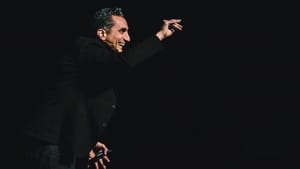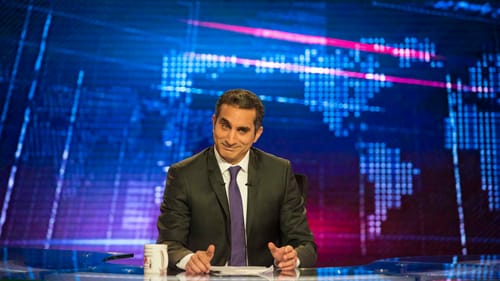Stay in the Loop
BSR publishes on a weekly schedule, with an email newsletter every Wednesday and Thursday morning. There’s no paywall, and subscribing is always free.
An unfortunate welcome
PIFA 2018: Bassem Youssef's 'The Joke Is Mightier Than the Sword'

I was thrilled to see Egyptian satirist Bassem Youssef, whom the American press ubiquitously calls “the Jon Stewart of the Arab world,” on the PIFA lineup. But I left his show feeling ashamed for Philadelphia and the festival that brought him here.
Onstage at Verizon Hall in jeans, sneakers, and a black button-down shirt, Youssef greeted the audience’s whoops as “So cute, so American!”
Arabs don’t make those sounds at public events, he said. They “do what Arabs do best. Sit quietly and look suspicious … so someone can see something and say something.” With the help of slides on a screen above him, he used pictures of our Super Bowl riots to rib us about upstaging the stereotype of Arabs as violent goons.
Standup, not storytelling
The Joke Is Mightier Than the Sword, billed by the Kimmel as a “stage show” that shares Youssef’s “personal story,” was more like a 90-minute standup set with some videos. For a performance from an international icon of fearless, incisive, and hilarious political commentary, it was remarkably anodyne.
Onstage, Youssef was determinedly coy about detailing his experiences under the Egyptian regimes that succeeded Hosni Mubarak after the Arab Spring, the threats he faced, and his flight to Dubai and later Los Angeles (now his home) with his wife and young daughter.
He’s more forthright in a recent interview with the Inquirer: “In the last four weeks, three or four of my friends were detained and taken from their houses. This is the type of consequences we have.”
Reasons to keep quiet?
There could be a couple reasons for his onstage reticence. As he emphasizes to the Inquirer, the show is designed for Americans: “I’m not just speaking to my base,” he says there. And as he noted in the show, Americans snag as many sarcophagi as we can for our museums but “think Egypt is somewhere between Narnia and Atlantis.”
Or maybe he has worries now that he didn’t have when his TV show, Al Bernameg (The Show), was on the air. His brother is his only family member still in Egypt, he said, and “I can’t say much because I fear for him.” He similarly deflected questions about his wife and kids, who travel back to Egypt annually, though Youssef himself cannot re-enter the country.
Or maybe he wants to sell books. During the show, he repeatedly directed audience members (who paid $45 for tickets) to buy his book, pre-signed in the lobby, if they wanted more of his personal story. But hey, it’s America, where the government can’t shut down TV shows or arrest you for satire (yet), and where free speech reigns (for now). Why not also partake in some lucrative self-promotion?

Muslim logic for the NRA
There were gems in his overlong routine. “America is my favorite colonial power,” he said. That’s because of our “finesse” (remember the “coalition of the willing”?) as well as our motives. Instead of invading other countries for tea and spices, like the Brits, we’re after something much more consequential: oil. And he loves our “reflection” on our foreign interventions in a plethora of fine movies from Platoon to Zero Dark Thirty; they should have their own “American guilt” category on Netflix.
He also would love to see Republicans apply their logic about guns to their problem with Muslims. How about “Muslims don’t kill people; people kill people”? Or “The only thing that can stop a bad Muslim is a good Muslim.” Or “The only solution to Muslims in America is more Muslims.”
But he also sprinkled the set with clichés. He talked about competing with his toddler for his wife’s breasts, and a bit about how American Muslims should insist on their Second Amendment rights for the sake of terrifying the NRA into some sense sounded lifted right from a recent piece by Mehdi Hasan in the Intercept.
A failure of presentation
Yet no flaw in Youssef’s act loomed larger than the way the Kimmel hampered his appearance. Verizon Hall’s stage dwarfed him in an undersold house, and it soon became clear he was using his smartphone during the show to control the slideshow himself.
He also used a laptop that kept crashing and forcing him to interrupt his act. He tinkered with the computer and controls as if we were at a library community meeting. A Kimmel staffer appeared onstage twice for apparently ineffective tech support, and at one point, Youssef waved him backstage again with an irritated slice of his arm.
The question-and-answer session that followed was completely unmoderated, with no assisting staff or microphones for the audience. Youssef stood onstage alone, fielding questions shouted from the balconies that were often inaudible to the rest of the house.
Especially with Kimmel producing artistic director Jay Wahl personally introducing the artist and sitting right in the orchestra section, the apparent lack of practical support for the performance was inexcusable. Bassem Youssef, who has risked everything for his right to speak up, deserves better from Philadelphia and from PIFA.
What, When, Where
The Joke Is Mightier Than the Sword. By Bassem Youssef. Philadelphia International Festival of the Arts. June 6, 2018, at the Kimmel Center’s Verizon Hall, 300 S. Broad Street, Philadelphia. (215) 893-1999 or pifa.org.
Sign up for our newsletter
All of the week's new articles, all in one place. Sign up for the free weekly BSR newsletters, and don't miss a conversation.
 Alaina Johns
Alaina Johns